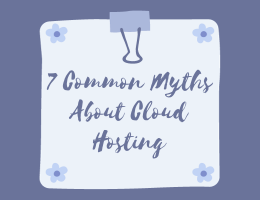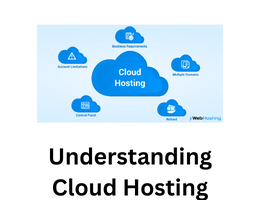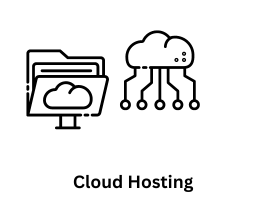
Types of Cloud Hosting
- By admin --
- Thursday, 26 Oct, 2023
Types of Cloud Hosting: Understanding the Versatility of Cloud Computing
Cloud hosting has revolutionized the way businesses and individuals manage their data and applications. It offers a wide range of options tailored to different needs, allowing users to harness the power of remote servers to store, process, and deliver their content efficiently. In this article, we'll explore the various types of cloud hosting and their distinct advantages.
1. Public Cloud Hosting:
Public cloud hosting is one of the most common and popular forms of cloud hosting. In this model, cloud service providers make their infrastructure available to the general public over the internet. Users can access and use resources on a pay-as-you-go basis. Leading public cloud providers include Amazon Web Services (AWS), Microsoft Azure, and Google Cloud Platform (GCP).
Advantages:
- Scalability: Public cloud hosting allows users to scale resources up or down quickly, making it ideal for businesses with fluctuating workloads.
- Cost-Efficiency: Users pay only for the resources they consume, reducing the need for upfront infrastructure investments.
- Global Reach: Public clouds typically have data centers in multiple regions, enabling global accessibility and redundancy.
Use Cases:
- Web hosting
- Application development and testing
- Data storage and backup
- Content delivery
2. Private Cloud Hosting:
Private cloud hosting is dedicated to a single organization and isn't shared with others. It can be hosted on-premises or by a third-party provider. The primary benefit of a private cloud is enhanced control and security, making it a preferred choice for businesses with stringent compliance and data security requirements.
Advantages:
- Enhanced Security: Private clouds offer greater control and security over data and resources, making them suitable for industries with strict regulations.
- Customization: Users can tailor the private cloud environment to meet specific business needs and workloads.
- Predictable Performance: Since resources aren't shared, users can expect consistent performance.
Use Cases:
- Healthcare data management
- Financial institutions
- Government agencies
- Research organizations
3. Hybrid Cloud Hosting:
Hybrid cloud hosting is a combination of both public and private cloud infrastructures, allowing data and applications to be shared between them. This flexibility enables organizations to balance cost-efficiency with security and control.
Advantages:
- Scalability: Users can take advantage of the public cloud's scalability while keeping sensitive data in a private cloud.
- Cost Optimization: Organizations can optimize costs by using public cloud resources when needed and relying on private cloud for critical data.
- Disaster Recovery: Hybrid cloud setups provide robust disaster recovery solutions.
Use Cases:
- E-commerce platforms
- Large enterprises with varying needs
- Applications with seasonal traffic variations
- Data backup and recovery
4. Community Cloud Hosting:
Community cloud hosting is designed for a specific group of organizations with shared interests or requirements. Multiple organizations, such as healthcare providers or educational institutions, may use a community cloud to collaborate while ensuring data privacy and compliance with sector-specific regulations.
Advantages:
- Collaboration: Multiple organizations with common goals can share resources and collaborate efficiently.
- Cost Sharing: Costs are shared among participating organizations, making it cost-effective for all members.
- Sector-Specific Compliance: Ideal for industries with specific regulatory requirements.
Use Cases:
- Healthcare information exchange
- Educational institutions
- Government collaborations
5. Serverless Cloud Hosting:
Serverless computing is a cloud computing model where cloud providers automatically manage the infrastructure, allowing developers to focus solely on writing code. With serverless hosting, users pay only for the actual compute time used by their applications.
Advantages:
- Cost Efficiency: Users don't need to provision or manage servers, resulting in cost savings.
- Scalability: Serverless platforms automatically scale based on workload, ensuring high availability.
- Simplified Development: Developers can focus on code, not infrastructure management.
Use Cases:
- Microservices
- Real-time data processing
- Web applications with variable workloads
6. Container Hosting:
Container hosting involves running applications in lightweight, portable containers. These containers include all the necessary dependencies, ensuring consistency and reliability across various environments. Container orchestration tools like Kubernetes help manage containerized applications efficiently.
Advantages:
- Portability: Containers can run consistently across different cloud providers and on-premises infrastructure.
- Resource Efficiency: Containers consume fewer resources compared to traditional virtual machines.
- Scaling: Containers can be easily scaled up or down to match demand.
Use Cases:
- Microservices architecture
- Continuous integration and continuous deployment (CI/CD)
- DevOps workflows
7. Distributed Cloud Hosting:
Distributed cloud hosting is an emerging concept where cloud resources are distributed across various physical locations, bringing cloud capabilities closer to end-users. This approach aims to reduce latency and improve the user experience.
Advantages:
- Low Latency: Distributed clouds reduce the distance data travels, resulting in lower latency.
- Edge Computing: Supports edge computing, enabling processing closer to the data source.
- Improved Reliability: Distributed setups enhance redundancy and reliability.
Use Cases:
- Content delivery networks (CDNs)
- IoT applications
- Real-time gaming
8. Function as a Service (FaaS):
FaaS, also known as serverless computing, focuses on executing individual functions or microservices in response to specific events. This approach is highly event-driven and offers flexibility and cost-efficiency.
Advantages:
- Scalability: Automatically scales based on the number of function executions.
- Cost Efficiency: Users pay only for the actual function execution time.
- Event-Driven: Ideal for handling events such as data uploads, user interactions, and more.
Use Cases:
- Real-time data processing
- Automation of repetitive tasks
- IoT event handling
9. IoT Cloud Hosting:
With the growth of the Internet of Things (IoT), specialized cloud hosting services cater to the unique needs of IoT applications. These services support the collection, processing, and analysis of data generated by connected devices.
Advantages:
- Scalability: IoT clouds can handle massive volumes of data from numerous devices.
- Real-Time Processing: Ideal for applications that require real-time data analysis.
- Device Management: Supports device provisioning, monitoring, and management.
Use Cases:
- Smart home systems
- Industrial IoT
- Healthcare wearables
10. Multi-Cloud Hosting:
Multi-cloud hosting involves using multiple cloud providers simultaneously, providing redundancy, cost optimization, and flexibility. It allows organizations to choose the best cloud for each specific application or workload.
Advantages:
- Vendor Flexibility: Avoid vendor lock-in and choose the best services from multiple providers.
- Redundancy: Enhance reliability and disaster recovery with resources on different clouds.
- Cost Optimization: Leverage competitive pricing and optimize costs for different workloads.
Use Cases:
- Businesses with a diverse application portfolio
- Risk mitigation
- Compliance with data sovereignty regulations
In conclusion, the world of cloud hosting offers a diverse array of options to meet the varied needs of businesses and individuals. Whether you





